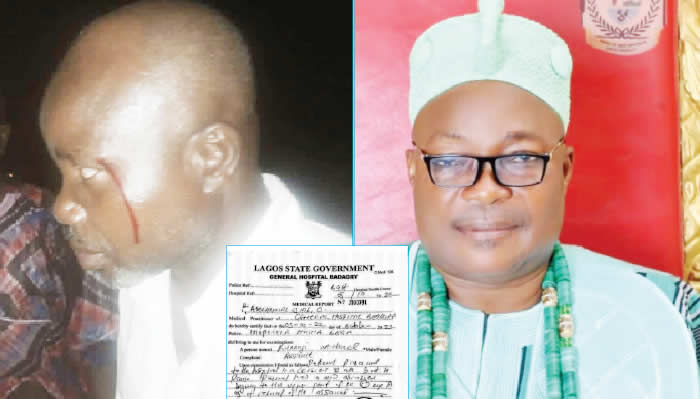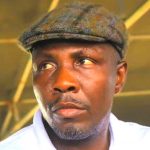...To get all news updates, Join our WhatsApp Group (Click Here)
Also Join our WhatsApp Channel (Click Here)
…accuses police of failing to arrest, and prosecute royal father
•Oba Adamson, Bishop Olajonlu: Allegation is a lie
•FCID Alagbon wades in
All is certainly not going well in Ajido community in Badagry local government area of Lagos State, following a misunderstanding between the monarch, Oba Saheed Adamson, and one of his chiefs, Michael Kunnuji.
Kunnuji, a US-based engineer, is accusing the Oba of assaulting him and, in the process, inflicted injuries on his face on Sunday, September 25, 2022.
Though Oba Adamson has denied assaulting anyone, the complainant is asking the police to take the matter to court.
Kunnuji said his insistence to prosecute his traditional ruler was to demonstrate that nobody is above the law.
According him, the Oba has been using his office to molest and intimidate the people of the community.
He said: “So many people have been molested and assaulted in Ajido by the king but they are afraid to speak up because of persecution. If anybody goes against the Oba, that person will certainly be in trouble.”
The chief berated police officers at the Badagry division for refusing to arrest the monarch when he reported the alleged assault matter to them.
“When the assault occurred, I went to the police station in Badagry to report. I told them I wanted to press charges but the officers at the station told me that they didn’t have a vehicle to go arrest him”, Kunnuji lamented.
“I asked them to use my vehicles. The next minute, they said they could not arrest him because he’s a king. And I asked them if anybody was above the law but they didn’t answer me.
“So they never arrested Adamson, that’s why I hired a lawyer to pursue the case”.
The Beginning
Narrating what transpired, the Gagbo of Ajido said his ordeal started when Adamson ordered the presiding Bishop of the United African Methodist Church, Ajido, Reverend M.A Olajonlu, not to conduct a thanksgiving service being organized by the church in his honour to celebrate my one year coronation anniversary as Gagbo, and as a Justice of Peace, JP.
“Before the church service that day, the bishop and two other persons from the Oba came to my house and pleaded with me that he would want me to go to the palace with him after the service. When I asked why, he said he had promised the Oba that he would come with me.
“So after the service, we went to the palace. When I walked in, I bended, nodded my head and said: ‘Your Royal Highness, greetings to the Kingdom’. To my surprise, the Oba retorted: ‘You see how he’s greeted the king?’ He then called me a lunatic three times and I said to him ‘you are a lunatic too’.
“In a swift reaction, he jumped down from his seat and savagely punched my face with a ring in one of his fingers. My face was bleeding but I didn’t react in anyway.
“This happened in the presence of the bishop and other members of the community. The bishop was to my right hand side that if I had dodged the punch, it would have hit him”.
When asked if there was a misunderstanding between him and the monarch before the assault incident, Kunnuji responded: “There had been petty issues here and there but I didn’t take them to be anything. “The first was during the opening of a technical college and a College of Technology that I built in the community. “The Oba was called upon to make a remark but he refused to speak, saying kings don’t talk in public. So he declined to make a comment on a college opening in his community. So you can see that something was wrong. “The second was the issue of electricity transformer. The transformer for the entire community got bad and the utility company said they were not going to spend a dime of theirs to replace the damaged transformer because the people don’t pay their electricity bills.
“So the people appealed to me to help buy the transformer for them. The king was mad and told me not to buy any transformer.
“So, I left the situation like that. After five months, nothing was done to restore electricity in the community. I decided to buy the transformer and that made the king more furious, totally angry at me.”
I didn’t assault anybody – Oba Adamson
But the Oba has vehemently denied assaulting Kunnuji or anybody else in his community, as he had no reasons to do so. He stressed that there’s no rift between him and Kunnuji, noting that he was only trying to correct his chief who was moving about in adorning regalia meant for Obas.
Adamson said: “Kunnuji behaved very rudely and as one of my chiefs, because I was the one that installed him as a white cap chief, it’s my duty to correct him. “However, to my dismay, the rudeness was so much that I said ‘this man, you look so stupid’ and he replied same to me. I told the guards at the palace to walk him away and that’s what happened.
“So, I never assaulted him. Why will I assault anybody? For what? There was no rift between the two of us. I was only trying to correct him that he could not be putting on regalia that belongs to an Oba.
“He goes about with a beaded horse tale, a beaded walking stick and a beaded staff of office. That is what I was trying to correct. “So I don’t have any problem with him. He’s someone that I believe could add value to the royal council and also develop the community together with me.”
On the alleged order to stop his thanksgiving service, the monarch described the allegation as a lie.
“I told the bishop that he should talk to him to stop carrying the regalia of an Oba”, Adamson said.
“I don’t belong to the church, so how can I stop anybody from conducting service?”
Bishop responds
When contacted, one of the eyewitnesses and Bishop of the United African Methodist Church, Ajido, Reverend M.A Olajonlu, admitted that Adamson did not hit Kunnuji.
“The issue was not like that as far I’m concerned (referring to the assault claims) because we were there together that very day”, Olajonlu said.
“Yes, there was hot exchange of words between the Oba and Kunnuji and Oba angrily arose but some chiefs went in-between to stop them and some people took him away.
“So I can tell you that the Oba didn’t hit him though he arose angrily in order to hit him but some people quickly prevented it from happening”.
On the alleged order by the monarch to stop Kunnuji”s thanksgiving service, the bishop added: “The Oba called me not to celebrate the event but I told him that this is a church and not a community matter. I told the king that thanksgiving was to appreciate God. He accepted and the thanksgiving was held.”
Police invitation
Meanwhile, Sunday Vanguard gathered that the warring parties were invited to the Force Criminal Investigation Department, FCID, by the Commissioner of Police at Alagbon, Ikoyi, Lagos, with the intention to resolve the matter.
When contacted on phone to speak on the outcome of the meeting, the officer in charge of public relations at Alagbon, DSP Eguaoje Funmilayo, asked our correspondent to speak to the concerned parties as she was not aware of the matter.
“Go and meet the party to hear from them the outcome of the police invitation or whatever, hear from them. It’s not everything that has to do with the police that journalists will always poke nose”, she retorted and dropped the call.
You can get every of our news as soon as they drop on WhatsApp ...To get all news updates, Join our WhatsApp Group (Click Here)
Also Join our WhatsApp Channel (Click Here)

















